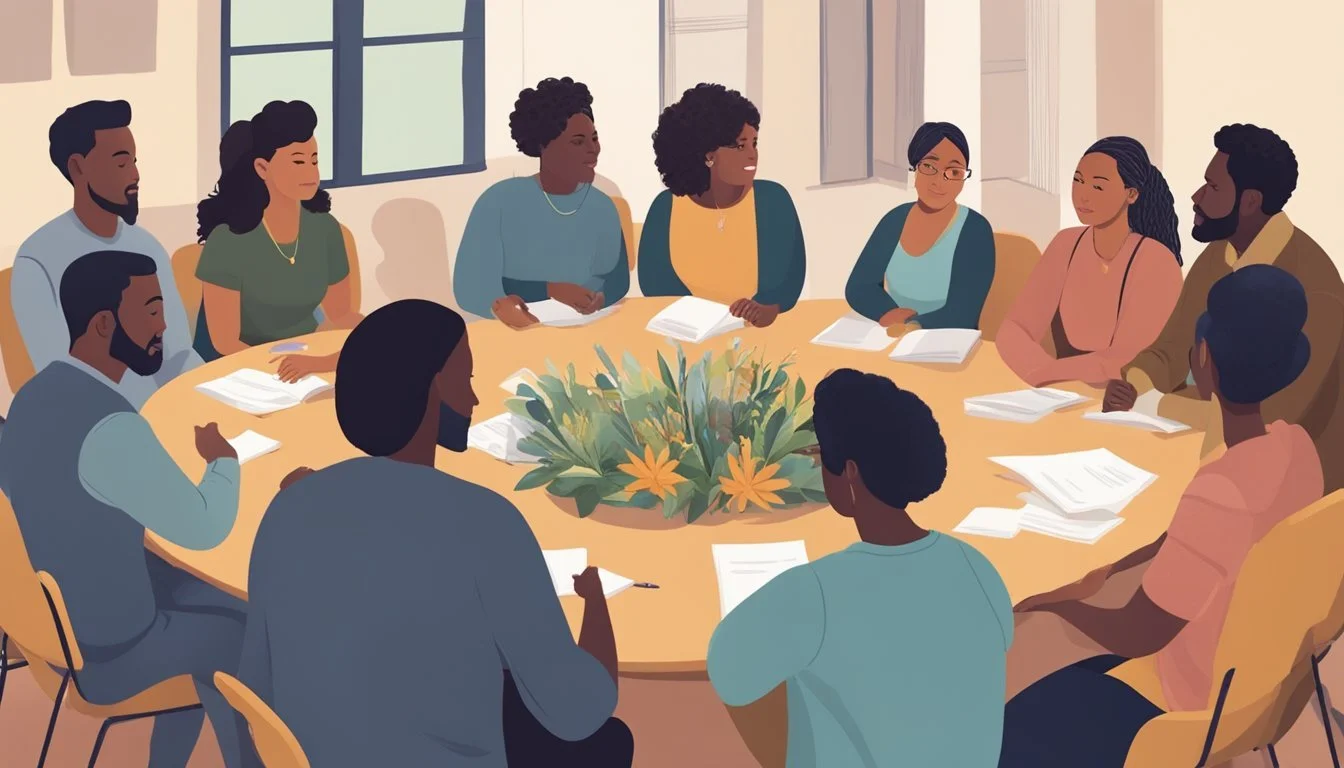10 Ways to Cultivate Self-Forgiveness as a Trauma Survivor
Practical Steps for Healing
Self-forgiveness is an often overlooked yet crucial aspect of healing for trauma survivors. Traumatically impacted individuals frequently wrestle with feelings of guilt and shame, making self-forgiveness a key component in their recovery journey. How can trauma survivors learn to forgive themselves, and why is it so important for their well-being?
The process of self-forgiveness involves understanding and addressing the deep-seated self-blame and negative emotions that arise from traumatic experiences. This article provides ten practical strategies to help trauma survivors cultivate self-forgiveness, enabling them to move forward with greater emotional freedom and resilience. Exploring these techniques can empower individuals to let go of past burdens and foster a kinder relationship with themselves.
1) Practice Mindfulness Meditation
Mindfulness meditation can be a powerful tool for trauma survivors seeking self-forgiveness. This practice involves focusing one's attention on the present moment, accepting and acknowledging thoughts and feelings without judgment. By fostering a non-judgmental awareness, individuals can begin to process difficult emotions more effectively.
Regular mindfulness meditation helps build a greater sense of self-awareness. This heightened awareness can pave the way for recognizing and understanding one's feelings of guilt or shame. Accepting these feelings without criticism can be an important step towards self-forgiveness.
Trauma-informed mindfulness techniques incorporate grounding and self-regulation methods to maintain balance in the nervous system. These adaptations make mindfulness meditation safer and more effective for trauma survivors. Ensuring a safe practice environment can help individuals feel secure while exploring their inner experiences.
Starting with guided sessions can be particularly beneficial for beginners. Resources like the 10-Minute Guided Self Forgiveness Meditation offer structured practices that can fit into busy schedules. These guided sessions focus on key mindfulness concepts like self-love and inner peace, providing a supportive framework for healing.
Over time, mindfulness meditation can help trauma survivors develop a deeper sense of compassion towards themselves. This compassion is essential in the journey towards self-forgiveness, enabling individuals to view their past actions with kindness and understanding.
2) Acknowledge Your Feelings
Recognizing and accepting your emotions is crucial in the journey of self-forgiveness. It's essential to take the time to fully experience what you're feeling.
Avoiding or suppressing your emotions can lead to further emotional distress. Instead, let yourself feel the pain, sadness, or regret fully.
Acknowledge that these feelings are valid. They are a natural response to the trauma you have experienced.
Consider journaling about your emotions. Writing can be a helpful way to process what you're feeling and gain clarity.
Talking with a trusted friend or mental health professional can also aid in acknowledging your feelings. Open communication helps in understanding and validating your emotions.
It's important to be patient with yourself. Healing takes time and acknowledging feelings is a critical step.
Focus on what your feelings are trying to tell you about your needs and desires. This awareness can guide your path to self-forgiveness.
For more detailed strategies on recognizing your emotions, visit Psychology Today’s 7 Steps to Self-Forgiveness.
By acknowledging your feelings, you set the stage for healing and cultivating self-compassion.
3) Seek Professional Therapy
Seeking professional therapy is a critical step in cultivating self-forgiveness for trauma survivors. Licensed therapists can provide a safe, non-judgmental space to explore and understand feelings of guilt and shame.
Cognitive Behavioral Therapy (CBT) is one method that helps individuals challenge negative self-criticism and develop self-compassion, fostering self-forgiveness. The therapist works with the individual to identify and change destructive thought patterns.
Forgiveness therapy is another effective technique. It helps minimize negative feelings such as depression, anger, and stress. Studies suggest that forgiveness therapy can significantly improve emotional well-being.
Therapists also guide clients through acceptance and grief processes, which are essential for letting go of past trauma. Recognizing and processing these emotions helps individuals move toward forgiveness.
Making therapy part of the healing journey can lead to profound personal growth. It equips trauma survivors with the tools to nurture self-compassion and forgiveness in a structured, supportive environment.
4) Journal Your Emotions and Thoughts
Journaling can be a powerful tool for trauma survivors. Writing down emotions and thoughts helps process complex feelings related to trauma. This method allows individuals to explore their inner world in a safe and private space.
A trauma survivor can benefit from specific prompts like those found in Self Forgiveness Journal Prompts: 32 Exercises to Let Go. Prompts help guide the writer and ensure they focus on self-forgiveness.
Another useful resource is the list of 75 Powerful Journal Prompts For Forgiveness. These prompts encourage mindfulness and help cultivate peace and acceptance. It's important for trauma survivors to develop these skills to move past negative emotions.
For self-forgiveness, prompts available in 66 Forgiveness Journal Prompts for Forgiving Yourself can be particularly helpful. Writing down thoughts can lead to greater self-awareness and understanding, aiding in the healing process.
Daily journaling can also assist in creating a habit of self-reflection. Consistent writing allows individuals to track their progress and recognize patterns in their emotions and behavior. This awareness is crucial for long-term healing.
5) Use Affirmations Like 'I Am Worthy'
Affirmations are a powerful tool for trauma survivors to cultivate self-forgiveness. Simple statements like "I am worthy" can help reframe negative thought patterns.
Using affirmations daily reinforces self-belief and combats feelings of unworthiness. Repetition of positive statements can gradually replace self-critical thoughts with compassionate ones.
Incorporating affirmations into a routine can be done in various ways. Saying them aloud in front of a mirror, writing them down, or repeating them silently can make them more effective.
"I am worthy" affirms intrinsic value, independent of past trauma. It's a reminder that everyone deserves love, respect, and kindness.
Affirmations can be customized to suit individual needs. Phrases like "I forgive myself" or "I deserve happiness" can be added to support the healing process.
For more ideas, consider exploring these self-worth affirmations and self-love affirmations. These resources provide a variety of phrases to incorporate into daily practice.
6) Read 'Radical Acceptance' by Tara Brach
One powerful way to foster self-forgiveness is by exploring the teachings in Radical Acceptance by Tara Brach. This book integrates insights from Buddhist philosophy, psychology, and meditation.
Tara Brach, a clinical psychologist and meditation teacher, presents a path to healing through acceptance and compassion. She addresses the deep-seated shame and fear that trauma survivors often experience.
The book emphasizes the importance of recognizing and embracing our emotions without judgment. Brach explains how self-aversion can trap individuals in a "trance," preventing genuine healing and self-forgiveness.
Radical Acceptance offers practical techniques for mindfulness and meditation, encouraging readers to create a compassionate "heartspace." These practices can help trauma survivors break free from patterns of self-criticism and cultivate a sense of inner peace.
Exploring this book can provide trauma survivors with valuable tools and perspectives to support their journey toward self-forgiveness and emotional recovery. For more information, visit Tara Brach's website.
7) Engage in Creative Activities
Artistic expression can be a powerful tool for self-forgiveness. Activities like painting, drawing, or sculpting allow individuals to express emotions that might be difficult to articulate. This process can help trauma survivors release pent-up feelings and foster emotional healing.
Writing is another creative outlet. Journaling about past experiences or writing fictional stories can provide a safe space to explore and work through complex emotions. It can lead to a deeper self-awareness and understanding.
Engaging in music, whether by playing an instrument or listening to calming tunes, can also be therapeutic. Music has a unique way of reaching deep emotional layers, providing comfort and a sense of connection.
Participating in dance or movement activities can help in physically releasing stored tension. This type of creative expression allows for an embodied experience of letting go, aiding in the journey toward self-forgiveness.
Cooking and baking offer a sensory and mindful experience. Experimenting with new recipes or creating favorite dishes can be a comforting and rewarding activity, contributing to emotional well-being.
Use of creative practices should be flexible and cater to individual preferences. Finding joy and solace in any form of art can significantly impact the path to self-forgiveness.
8) Set Boundaries to Protect Your Peace
Setting boundaries is crucial for maintaining mental and emotional well-being, especially for trauma survivors. Boundaries act as a shield, protecting your peace by defining what is acceptable in your relationships and interactions.
Healthy boundaries help to avoid situations that can trigger past trauma. They create a safe space for healing and growth.
Boundaries are not just about keeping out the negative but also about making room for the positive. They allow for nurturing relationships that respect your needs and limits.
Communicating boundaries clearly and assertively is essential. It ensures that others understand your limits and reinforces your self-worth.
Boundaries can include saying no to certain requests, limiting contact with certain people, or setting aside personal time for self-care.
By establishing and maintaining boundaries, trauma survivors can reclaim control over their lives. It's a powerful step towards self-forgiveness and healing.
According to the Touch of God, healthy boundaries reduce frustration and foster inner peace.
Loving yourself enough to set and enforce boundaries is an act of self-care. This practice is foundational for anyone working through the aftermath of trauma. It helps to create a balanced environment for recovery.
Growing through trauma involves strength and resilience. Setting boundaries is one of the key ways to protect that peace.
9) Join Support Groups or Communities
Connecting with others who have experienced similar trauma can be incredibly beneficial. Support groups offer a safe space to share feelings and experiences. This collective empathy can foster understanding and compassion for oneself.
Support groups can be found both in-person and online. Local community centers and mental health organizations often host these gatherings. Online platforms also provide anonymity and access to global communities.
Engaging in these groups helps trauma survivors realize they are not alone. Hearing others' stories can provide new perspectives on handling personal struggles. This sense of community can alleviate feelings of isolation and shame.
Professional facilitators often guide these groups. Their expertise ensures discussions remain supportive and therapeutic. Participating regularly can aid in the journey toward self-forgiveness by consistently reinforcing positive coping mechanisms and emotional support.
Feeling understood and validated by peers can be a strong motivator in healing. It helps individuals replace self-critical thoughts with self-compassionate ones. Support groups are a valuable resource for anyone looking to cultivate self-forgiveness.
For more insights and guidance on community forgiveness, check out ways to build a more forgiving community. These principles can also apply to personal healing and forgiveness.
10) Volunteer and Give Back
Volunteering offers a powerful way to foster self-forgiveness for trauma survivors. By helping others, individuals can shift their focus outward, which can alleviate persistent negative self-talk.
Engaging in community service allows trauma survivors to connect with others. This sense of connection can be especially healing and help counter feelings of isolation.
Giving back instills a sense of purpose. Contributing to a cause larger than oneself reinforces self-worth and capability.
Moreover, volunteering offers tangible reminders of one's strengths and positive impact. This can be incredibly affirming for those struggling with self-forgiveness.
Opportunities to volunteer are abundant. Whether through local non-profits, community centers, or online initiatives, there are numerous ways to get involved.
A meaningful example is assisting at a local shelter. Trauma survivors can find that their past experiences uniquely position them to offer empathy and understanding to those in similar situations.
Additionally, volunteering does not require a significant time investment. Even a few hours a month can make a notable difference in one's life and community.
Self-forgiveness can be bolstered by these acts of service. Redirecting efforts to help others can lead to personal healing and growth.
For practical tips on how to get started with volunteering, consider exploring resources like Positive Psychology's self-forgiveness techniques or Lifehack’s guide to self-forgiveness. These resources offer a comprehensive exploration of strategies to foster forgiveness and personal growth.
Understanding Self-Forgiveness
Self-forgiveness involves letting go of guilt and shame, which are often entrenched in self-blame. This process is crucial for trauma survivors to foster personal growth and mental well-being.
Importance of Self-Forgiveness for Trauma Survivors
Trauma survivors often struggle with self-blame, believing they could have prevented or reacted differently to their traumatic experiences. This deep-seated guilt can hinder their recovery and perpetuate emotional suffering.
Self-forgiveness allows trauma survivors to acknowledge their pain without being consumed by it. By doing so, they can start to rebuild their sense of self-worth. Learning to forgive oneself is a step toward embracing one's own humanity and imperfections.
Embracing self-forgiveness helps survivors to be kinder to themselves, which is a fundamental part of healing. It enables them to carve a path toward a more peaceful and fulfilling life.
Psychological Benefits
The psychological benefits of self-forgiveness are vast. Letting go of self-blame can decrease stress and anxiety significantly. It allows individuals to develop a healthier self-image, which is essential for emotional stability.
Practicing self-forgiveness is linked to greater emotional resilience. It helps individuals bounce back from setbacks and reduces the likelihood of falling into negative thought patterns.
Additionally, self-forgiveness promotes better interpersonal relationships. Individuals who forgive themselves are more likely to extend the same compassion to others, creating a positive feedback loop in their social interactions. This fosters a supportive environment, crucial for ongoing recovery.
Barriers to Self-Forgiveness
Addressing self-forgiveness as a trauma survivor involves understanding common misconceptions and how trauma affects self-perception. Knowing these barriers can help in identifying ways to navigate through them effectively.
Common Misconceptions
Self-forgiveness means excusing one's actions. This misunderstanding can impede progress. Self-forgiveness involves acknowledging mistakes without condoning harmful behavior. It fosters personal growth and healing.
Thinking self-forgiveness is selfish is another misconception. Many believe that forgiving themselves takes away the significance of the harm done to others. In reality, it enhances one's ability to make amends and rebuild relationships.
Believing it's a one-time event can create frustration. Self-forgiveness is a continuous process requiring constant effort and self-compassion. This journey often includes setbacks, which are a natural part of healing.
Disregarding the importance of emotional self-care can also be problematic. Holistic practices like meditation, exercise, and hobbies can support the self-forgiveness process and promote well-being. For further insights on engaging in self-care practices.
Impact of Trauma on Self-Perception
Trauma significantly shapes how individuals view themselves. Survivors often struggle with guilt and shame, believing they are at fault for their experiences. This distorted self-perception hinders the ability to initiate self-forgiveness.
Internalized negative beliefs resulting from trauma can make survivors feel unworthy of forgiveness. Stigmatization and societal attitudes often exacerbate these feelings, reinforcing the cycle of self-blame.
Hypervigilance and mistrust are common in trauma survivors. This heightened state can lead to difficulty in distinguishing between genuine accountability and excessive self-criticism.
Facing the trauma and its impacts directly is crucial. Accepting responsibility for one's actions, while maintaining compassion, is a foundational step in the self-forgiveness journey.
Recognizing these barriers and addressing them holistically can pave the way toward genuine self-forgiveness and improved mental health.
Therapeutic Approaches
Therapy can be incredibly beneficial for trauma survivors seeking to cultivate self-forgiveness. Two effective approaches include Cognitive Behavioral Therapy (CBT) and mindfulness practices.
Cognitive Behavioral Therapy (CBT)
Cognitive Behavioral Therapy (CBT) is a structured, goal-oriented approach that helps individuals identify and challenge negative thought patterns. For trauma survivors, CBT can be particularly useful in addressing self-criticism and guilt.
Key Elements:
Identification of Negative Thoughts: CBT helps individuals recognize irrational thoughts contributing to their inability to forgive themselves.
Cognitive Restructuring: The therapist works with the individual to replace negative thoughts with more balanced perspectives.
Skill Development: Techniques such as journaling and positive affirmations are often used to reinforce healthier thought patterns.
CBT promotes self-awareness and self-compassion, allowing trauma survivors to see themselves more empathetically. This method has been shown to be effective in reducing symptoms of PTSD and related anxiety.
Mindfulness Practices
Mindfulness practices emphasize staying present and aware, which can be particularly helpful for trauma survivors struggling with self-forgiveness. These practices encourage a non-judgmental and compassionate stance toward oneself.
Key Elements:
Meditation: Techniques such as guided imagery and body scans help individuals tune into their emotional state without judgment.
Breathwork: Conscious breathing exercises can reduce stress and promote a sense of calm and centeredness.
Mindful Self-Compassion: Practices like loving-kindness meditations foster kindness towards oneself and others.
By integrating mindfulness into daily routines, trauma survivors can gradually develop a balanced and forgiving self-view. Research shows that consistent mindfulness practice can reduce symptoms of depression and improve emotional regulation.
For more information, explore these therapeutic options on forgiveness and CBT therapy and forgiveness therapy techniques.






